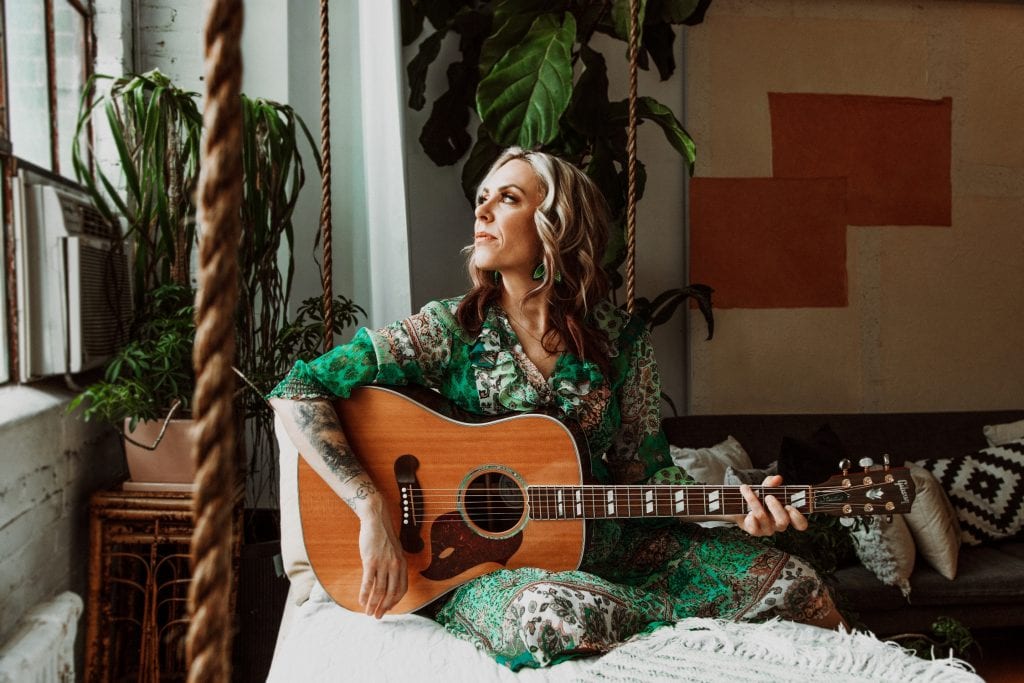Q&A With Amanda Rheaume
By Christopher Treacy & Amanda Rheaume

Amanda Rheaume’s album ‘The Spaces In Between’ arrived earlier this year and somehow got past us, despite it being an accomplished album from a powerful queer artist. Rheaume, a recognized figure in the Métis community, is based out of Ottawa and is five albums and fifteen years deep into a career that shows no signs of slowing down—she recently inked a distribution deal linking her Ishkōdé Records label with Universal Music Canada.
‘The Spaces In Between’ is a bold record that’s unflinching in its examination of our concepts of identity and how they get used to both unite and divide. As an indigenous queer woman, Rheaume’s perspective is rich with life experience and observations that we don’t always hear in more mainstream country and Americana. “Do About Her,” co-written with Kinnie Starr, hashes is out so powerfully, reinforcing the damage caused by this very human (but terribly unfortunate) trait of feeling compelled to act or to choose sides. We were so taken with it, we made it our new Song of The Week in the current CQ Roundup. She was kind enough to take a few minutes and answer some questions.
Is “Do About Her” autobiographical/inspired by your own experiences? Is it a composite sketch of your own experiences and your observance of those of other women?
“Do About Her” isn’t based on any one person’s experience, although I know many people that relate to this song. My hope is that this song encourages conversation as a starting point to recognize the harm that colonial policies, historic and present day, have done to us as individuals and as a collective. How do we want to treat each other? This song is meant to speak to the divisive nature of identity politics in modern times.
The alternating images – bullet, blanket, plate, blade – Was it a deliberate choice to utilize such polar opposites? It would seem there’s no middle ground. Is that how this tends to play out in these communities?
Kinnie Starr and I were very deliberate and hoped the lyrics would make people stop and think, we wanted to push some boundaries. It is my belief that music/art can assist in pushing people to think and feel outside of their comfort zone. And yes, I would say identity politics are polarized.
The song may be specific to a set of circumstances, but it speaks to the larger conversation about being “other.” Were you aware of that as you were writing it – the larger implications? Or were you immersed in a specific story?
The song definitely talks about being “other” and then also about not fitting into the “other” while being “othered”. It’s about not feeling Metis enough, not feeling queer enough. All those things. Kinnie and I weren’t immersed in a specific story per say, more taking a look at how people are treating each other online and in community.
Can you tell us a little about what’s happening with Ishkōdé Records? The distribution deal with UM is exciting and can bring music from Indigenous artists to a larger audience – we hope!. Are you going to release your next album through this channel?
Ishkōdé Records just released Aysanabee’s debut album Watin! We are so excited about Aysanabee, the stories he is sharing and the music he is making. Universal Music Canada has been an incredible partner as we launched the label. I released The Spaces In Between on Ishkōdé this past May and will definitely be releasing my next album on Ishkōdé as well.
Christopher Treacy has been writing about music and the music industry for 20 years. He’s contributed to The Boston Phoenix, The Boston Herald, Nashville Scene, and Berklee College of Music’s quarterly journal, as well as myriad LGBTQ+ outlets including the Edge Media Network, Between the Lines/Pride Source, Bay Windows and In Newsweekly. He’s the Managing Editor for CQ and lives in Waitsfield, VT.
Got new music? Submit it to CQ.